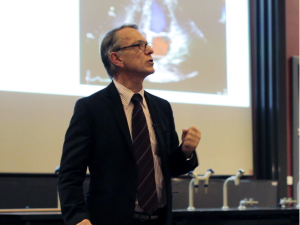Healthy aging. How can we slow down and delay the aging process? Certainly, nutrition is one factor in anti-aging. Specifically, adequate intakes of the micronutrient selenium may prevent disease and may enhance healthy aging. Inadequate intakes of selenium, on the other hand, may result in diminished immune function and may accelerate the aging process [Bjorklund 2022].

To a considerable extent, aging is associated with the oxidative damage caused by harmful free radicals to cells and DNA and proteins. Selenium through the work of antioxidant selenoproteins, e.g., the glutathione peroxidases and the thioredoxin reductases, improves our bodies’ antioxidant defenses against free radical damage [Bjorklund 2022; Avery & Hoffmann 2018].
We also need selenium to regulate inflammatory responses in the body. Chronic low-grade inflammation is associated with the development of aging-related diseases and with the aging process itself. Concurrent administration of selenium and Coenzyme Q10 has reduced the level of blood biomarkers of oxidative stress and inflammation significantly [Alehagen 2021].
Selenium Deficiency and Disease and Aging
Bjorklund et al estimate that selenium deficiency affects one billion people in the world. It can have significant adverse effects on human health [Bjorklund 2023]. A comprehensive review has reported widespread suboptimal selenium status throughout Europe, the UK and the Middle East [Stoffaneller & Morse 2015].
Adequate selenium intake
Selenium is a trace element that our bodies cannot synthesize themselves. The intake of selenium must come from food and supplements. Larsen et al suggest that we need a daily intake of at least 100 mcg of selenium to achieve an ideal serum selenium concentration of 120-130 mcg/L [Larsen 2024].
Sub-optimal selenium intake and status
Al-Mubarak et al have documented serum selenium status below 70 mcg/L as a deficiency level. They have also shown that serum selenium status below 100 mcg/L is a suboptimal selenium level. This suboptimal status is
associated with lower exercise capacity, lower quality of life, and worse prognosis of heart failure [Al-Mubarak 2021].
Schomburg has pointed to serum selenium concentrations below 45 mcg/L as severe deficiency status [Schomburg 2021].
Selenium-containing selenoproteins play a major role in the health
maintenance of aging individuals [Bjorklund 2023; Alehagen 2021]. Adequate intakes of selenium can efficiently stimulate the immune system against infectious diseases or cancer [Bjorklund 2023].
Combined Selenium and CoQ10 Protection Against Aging
In the KiSel-10 Study, Prof Urban Alehagen and a group of researchers randomly assigned elderly community dwelling Swedish citizens to take a combination of selenium and Coenzyme Q10 or matching placebos. The study participants were demonstrably low in selenium: mean serum selenium status = 67.1 mcg/L [Alehagen 2021].
The daily dosage was 200 mcg of selenium in a selenium-enriched yeast preparation and 200 mg of Coenzyme Q10. The duration of the intervention was four years [Alehagen 2021]. The supplementation with 200 mcg/day of selenium raised the mean serum concentrations to 210 mcg/L [Alehagen 2020].
Compared with the placebo group, the active treatment group’s blood levels showed the following significant health benefits [Alehagen 2023]:
- reduced levels of oxidative stress biomarkers
- reduced levels of chronic inflammation biomarkers
- reduced levels of fibrosis biomarkers
- reduced levels of biomarkers of endothelial dysfunction
- anti-aging impact on five age-related biomarkers
- conserved length of leukocyte telomeres
Conclusions: Selenium and Delayed Aging
Individuals with low selenium intakes and status are at greater risk of accelerated aging.
Oxidative stress and chronic low-grade inflammation contribute to this accelerated aging process.
Selenium supplementation, in particular combined with Coenzyme Q10 supplementation, can counteract the adverse effects of oxidative stress and chronic inflammation.
Combined selenium and Coenzyme Q10 supplementation of individuals with a low status of both substances can promote healthy aging.
Sources
Al-Mubarak AA, van der Meer P, Bomer N. Selenium, selenoproteins, and heart failure: current knowledge and future perspective. Curr Heart Fail Rep. 2021 Jun;18(3):122-131.
Alehagen U, Aaseth J, Alexander J, Johansson P, Larsson A. Supplemental selenium and coenzyme Q10 reduce glycation along with cardiovascular mortality in an elderly population with low selenium status – A four-year, prospective, randomised, double-blind placebo-controlled trial. J Trace Elem Med Biol. 2020 May 4;61:126541.
Alehagen U, Opstad TB, Alexander J, Larsson A, Aaseth J. Impact of selenium on biomarkers and clinical aspects related to ageing. a review. Biomolecules. 2021 Oct 7;11(10):1478.
Alehagen U, Alexander J, Aaseth JO, Larsson A, Svensson E, Opstad TB. Effects of an intervention with selenium and coenzyme q10 on five selected age-related biomarkers in elderly Swedes low in selenium: results that point to an anti-ageing effect-a sub-analysis of a previous prospective double-blind placebo-controlled randomised clinical trial. Cells. 2023 Jul 4;12(13):1773.
Avery JC, Hoffmann PR. Selenium, selenoproteins, and immunity. Nutrients. 2018 Sep 1;10(9):1203.
Bjørklund G, Shanaida M, Lysiuk R, Antonyak H, Klishch I, Shanaida V, Peana M. Selenium: an antioxidant with a critical role in anti-aging. Molecules. 2022 Oct 5;27(19):6613.
Larsen C, Winther KH, et al. Selenium supplementation and placebo are equally effective in improving quality of life in patients with hypothyroidism. Eur Thyroid J. 2024 Jan 1;13(1):e230175.
Schomburg L. Selenium deficiency due to diet, pregnancy, severe illness, or covid-19-a preventable trigger for autoimmune disease. Int J Mol Sci. 2021 Aug 8;22(16):8532.
Stoffaneller R, Morse NL. A review of dietary selenium intake and selenium status in Europe and the Middle East. Nutrients. 2015 Feb 27;7(3):1494-537.
The information presented in this review article is not intended as medical advice. It should not be used as such.
